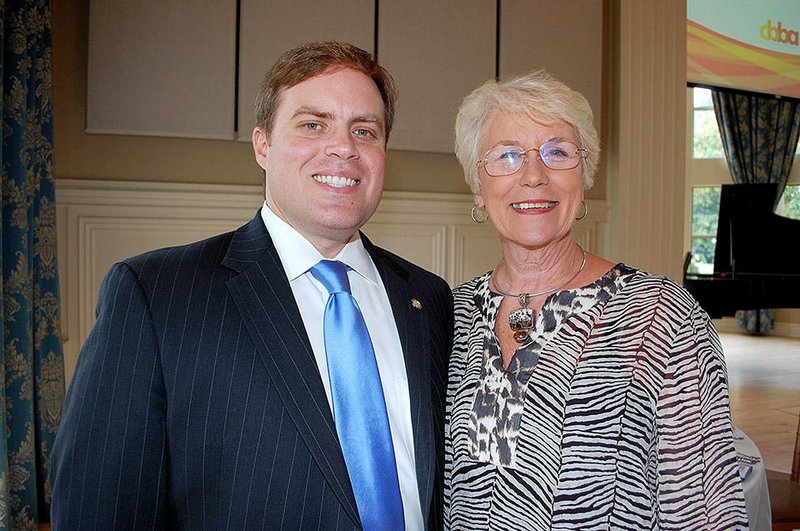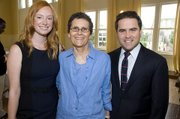Correction: Mark Rushing is a spokesman for the University of Arkansas at Fayetteville. This article incorrectly reported his last name.
Nearly two weeks after voters approved a constitutional amendment barring state elected officials from accepting certain gifts from lobbyists, a lobbyist for the University of Arkansas at Fayetteville urged 33 lawmakers, who received free parking permits in October for football games, to consult their attorneys about the matter.
The value of each parking permit was $20 per game, wrote Randy Massanelli, the school's vice chancellor for governmental relations.
One of the games was played against the University of Alabama at Birmingham on Oct. 25 before the Nov. 4 vote on Issue 3; two other games were played against Louisiana State University on Nov. 15 and the University of Mississippi on Nov. 22 after the gift restrictions passed.
The lawmakers were already required to pay for their own season tickets because UA doesn't provide free tickets to them, according to a UA spokesman.
Season ticket-holders who qualify for parking through the Razorback Foundation receive parking passes at no additional cost.
"With the effective date of Nov. 5, 2014, for [Issue 3] and no clarifying language set forth yet by the appropriate governing commission on how/when gifts are to be defined (date given or date of actual use), we felt it prudent to inform you that we feel you should consult with the legal staff or your respective body and make your own determination in deciding your authorized use of the parking permit for the 11/15/14 and 11/22/14 games," Massanelli wrote.
State Sen. Jon Woods, R-Springdale, and Rep. Warwick Sabin, D-Little Rock, sponsored the measure that's now Amendment 94 to the Arkansas Constitution. Woods said he wrote a check for $40 to UA to pay for the free parking permits for the two November games, after he received Massanelli's email.
Twenty-five other lawmakers, including two who are not season ticket-holders, have done likewise, according to UA spokesman Mark Rush.
UA officials "have not been able to determine under the new law if those provided football parking passes this season would need to pay or not because the passes were provided before the law's passage. It is unclear if the law should be applied on the day a pass is given or the day it is used," he said.
Asked whether Amendment 94 required the repayment, Woods said: "You never know. We are just trying to figure out the amendment.
"It's always better to error on the side of caution," he added in an interview last week.
Like lobbyists for other interests throughout Arkansas, the state's colleges and universities and their lobbyists have been grappling with these types of decisions since voters passed the restrictions.
Spokesmen for the colleges and universities said they're no longer providing the occasional free football or basketball tickets and free parking passes to lawmakers. They've said they also are reconsidering whether to hold certain events during the legislative session.
Rep. Tommy Thompson, D-Morrilton, said he hasn't paid UA for the free parking permits.
"The pass for parking was given prior to the date of the game and election, so there was no way the UA could be out of line," Thompson wrote in an email to the Arkansas Democrat-Gazette. "When the gift is used really has no effect."
Sen. Bruce Maloch, D-Magnolia, said he didn't attend the games or use the parking passes and hasn't written the school a check for them.
In keeping with Amendment 94, "I did not accept or utilize anything of value after the election date," Maloch explained.
Rep. David Whitaker, D-Fayetteville, said in an email that he didn't pay UA for the parking permits because he walked to the LSU game and didn't attend the University of Mississippi game, "so we didn't use the pass in November."
Rep. Scott Baltz, D-Pocahontas, said in an email that he didn't pay UA for the permits either because he "did not go to those games, and I disposed of them in the trash. Didn't want any problems."
Under Amendment 94, state lawmakers, the seven constitutional officers -- such as governor and attorney general -- and members of a new citizens commission that will set salaries for lawmakers, constitutional officers and judges "shall not knowingly or willfully solicit or accept a gift from a lobbyist, a person acting on behalf of a lobbyist, or a person employing or contracting with a lobbyist."
The amendment defines a gift as "any payment, entertainment, advance, services, or anything of value, unless consideration of equal or greater value has been given therefor."
The amendment provides several exemptions for gifts, including "food or drink available at a planned activity to which a specific government body is invited," "anything of value that is readily available to the general public at no cost," and "payments by regional or national organizations for travel to regional or national conferences at which the state of Arkansas is requested to be represented by a person or persons elected or appointed to an office" such as state lawmakers and constitutional officers.
A governmental body means "an office, department, commission, council, board, committee, legislative body, agency or other establishment of the executive, judicial or legislative branch of the state, municipality, county, school district, improvement district, or any political district or subdivision thereof," according to the amendment.
State law previously defined a special event "as a planned activity to which a specific governmental body or identifiable group of public servants is invited."
The state Ethics Commission previously concluded that the General Assembly, state House of Representatives or Senate, and their committees are "a specific governmental body," while House and Senate partisan caucuses are "an identifiable group," according to Graham Sloan, the commission's director.
As lawyers review the requirements of Amendment 94, lobbyists and others are altering how they do business.
UA System President Donald Bobbitt had planned to invite members of the Legislative Black Caucus to have coffee and dessert Dec. 2 at his home. But the idea was dropped after questions were raised relating to Amendment 94.
"We were uncertain of the status of the various legislative caucuses (e.g. Black Caucus, Sportsmen's Caucus, Oil and Gas Caucus, etc.) under the definitions outlined in Amendment," UA System spokesman Nate Hinkel said.
Woods said he and Sabin intend to sponsor legislation to grant the Ethics Commission authority to enforce the provisions of Amendment 94 and for its staff to advise elected officials.
He said he and Sabin have met with more than 20 people including business leaders, lawmakers, lobbyists and civic leaders, and about 10 have sought some sort of exemption from the amendment's ban on lobbyists providing certain gifts to the state's elected officials.
Woods said, "We have not made any promises at this point. We are trying to listen to everyone and be responsive."
At Arkansas State University, System President Chuck Welch advised system officials several weeks ago that "no gifts should be provided to any of the officials covered by this new law.
"While the scope of this new law is being discussed and is likely to be clarified later by the General Assembly, until we receive such clarification at this time we are proceeding as though the system is covered by this prohibition," Welch wrote in an email dated Nov. 6.
As a result, ASU "will no longer provide free tickets, parking passes or gifts to members of the General Assembly," said ASU System spokesman Jeff Hankins.
The University of Arkansas at Little Rock has occasionally given elected officials free basketball tickets and complimentary refreshments at those games; it also provided small gifts such as UALR-branded items to legislators at receptions and other gatherings, said UALR spokesman Judy Williams.
"Per the language of Amendment 94, these type of items will not be provided moving forward until further guidance is available that would indicate the appropriateness of doing so," Williams said.
At the University of Central Arkansas in Conway, "we have provided [state lawmakers] tickets and parking passes when we knew they were coming to sporting events or other events on campus," said UCA President Tom Courtway.
"Giving out the parking passes and tickets to sporting or other type of entertainment events will be discontinued until/if there is guidance or clarification on Amendment 94," he added.
At Henderson State University in Arkadelphia, "in the past, we have offered our local legislators tickets to the Henderson State University football games," and "now that the requirements have changed, we are stopping the practice," said Henderson State spokesman Tonya Smith.
While ASU has held a legislative day at the Legislature in the past, it "may host a university day in the future, but would follow the new restrictions if this occurs," Hankins said.
The University of Arkansas at Fayetteville has held a university day at the Legislature in the past, and "if we plan a university day in the future, we don't see how under our interpretation of Amendment 94 that this would change the practice as the entire General Assembly is always invited," said Rush.
UCA has held receptions and sometimes a breakfast for lawmakers, and "we will also determine ourselves, whether a reception or a breakfast should be held, even if permitted under Amendment 94," Courtway said.
Hankins said ASU has invited lawmakers to campus for a football game each year, and ASU "would only provide tickets if the entire General Assembly is invited to a game" and that's not been decided for next year.
Elected officials will have to pay their own way if they want to attend the Go-Daddy Bowl in Mobile, Ala., between ASU and the University of Toledo, he said.
Lawmakers hoping to see the Razorbacks play in the Texas Bowl at Houston won't get preferential treatment, Rush said.
SundayMonday on 12/21/2014


